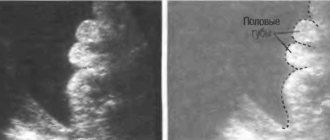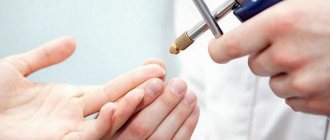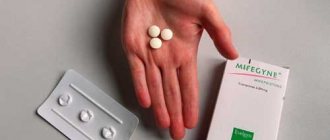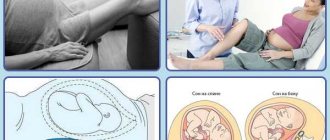Is it possible to have a tooth removed during pregnancy?
Many studies conducted over a long period of time indicate that during pregnancy the level of pathogenic microflora in the oral cavity increases. At the same time, banal caries can transform into serious diseases in a fairly short time, affecting the periodontal tissues of the tooth. In some cases, complications make it impossible to save the unit.
Dentists say that during pregnancy a tooth can and should be removed if it bothers the patient. Enduring pain is much more dangerous for the mother and her unborn child. In addition, if an infectious focus has formed in the area of the causative tooth, then it will need to be disposed of urgently. At the same time, pregnant patients must inform the doctor about their condition at the beginning of their appointment. After this, a treatment plan will be drawn up.
Video on the topic
One more opinion. Regarding the question of whether it is possible to remove teeth for pregnant women, in the program of Dr. Komarovsky:
You need to understand that conception will first of all provoke a restructuring of the body. The fetus will begin to “take away” calcium and other mineral components, which will begin to contribute to tooth decay. To prevent this from happening, you need to prepare your body for pregnancy as best as possible and strengthen your protective functions.
If it is difficult to deal with such issues on your own, you can consult a gynecologist in advance about your planned pregnancy. The doctor will tell you in detail what you need to take, when, how and for how much.
Indications and contraindications
Pregnant women are a special category of patients. When choosing a treatment plan, the doctor always takes into account all possible risks and the need for one or another manipulation. Feasibility is determined based on the availability of indications. But before removing a tooth, possible prohibitions are identified even more carefully.
Tooth extraction during pregnancy is indicated in the following cases:
- When conservative treatment is impossible or does not give the desired result.
- For acute purulent inflammation affecting bone tissue.
- If the pain cannot be tolerated.
- When an abscess or phlegmon develops.
- When the infection spreads to other tissues (a diseased tooth can cause the development of sinusitis, lymphadenitis).
- For some types of fractures of the tooth and its root system.
The following situations are considered contraindications:
- It is extremely undesirable to remove a tooth during pregnancy in the early stages (up to 12 weeks) and during the last month of gestation;
- They also try to postpone the extraction of third molars until the postpartum period.
In some cases, consultation with a gynecologist or other specialists is required. Only after this the doctor decides whether to remove teeth during pregnancy, or whether it is better to postpone the operation for a while. Read more about tooth extraction→
How does the extraction take place?
To begin with, the doctor and the patient choose the appropriate time for treatment. It is also very important to choose a mild anesthetic so that it works well, but is also allowed for use by pregnant women (the medicine should not cross the placenta).
It is imperative to carry out preventive procedures at home - rinsing with herbal decoctions and a solution with soda. If there is severe pain, it is allowed to take Paracetamol or Tempalgin, but in a strict dosage.
When a third molar needs to be removed, the dentist will cut through the gum, drill into the bone, and then use forceps to pull it out. After this, the doctor applies stitches to speed up the healing of the wound.
Features of tooth extraction during pregnancy
The opinion of all doctors agrees that it is advisable to eliminate all dental problems before a woman manages to become pregnant. If there is a need to remove a tooth, then the doctor can only plan his actions in such a way that they affect the development of the fetus as little as possible.
Tooth extraction in the first trimester of pregnancy
During this period, it is highly undesirable to carry out any dental procedures. If possible, the operation is postponed until 13–14 weeks. By that time, the placenta and the baby’s internal organs will already be formed.
Tooth extraction during pregnancy is carried out under the influence of anesthetic drugs. Modern medicines are completely harmless. X-ray examinations at the beginning of the period are prohibited. The fact is that radiation can easily overcome the biological barrier, having a negative impact on the development of the fetus. Even the use of a protective apron does not provide guaranteed protection. Read more about anesthesia in dentistry→
Tooth extraction in the second trimester of pregnancy
In the period from 13 to 27 weeks, there are fewer concerns about the need for extraction. Usually by this time the condition of the pregnant woman herself will have stabilized a little and tooth extraction will become less stressful for her.
Starting from the 16th week, X-ray examination is allowed. But provided that there is an urgent need for this, and the procedure is done using new equipment. Modern dentistry is armed with radiovisiography devices. The devices make it possible to display information on a computer screen using a special sensor. The advantage of this research method is reduced radiation exposure. In a radiovisiograph it is 10–15 times less than in a conventional X-ray machine.
Tooth extraction in the third trimester of pregnancy
Doctors do not recommend pulling out teeth during this period, as excessive stress can lead to premature birth. But the presence of an infectious focus in the body is also extremely undesirable. A pregnant woman should definitely consult a gynecologist. And, if there are no contraindications, the surgeon will remove the tooth.
Contraindications
- Is it possible to remove damaged teeth for pregnant women in the 9th month? During this period, surgery is not recommended. There is a possible risk of complications and the threat of premature birth.
- Can pregnant women have their teeth pulled out under anesthesia? It is possible if special drugs are used that do not harm the child.
- Can pregnant women have their growing wisdom teeth removed? This procedure is postponed if possible and performed after childbirth.
- Is it possible to have a tooth pulled out during 1 – 12 weeks of pregnancy? At such a time, extraction is dangerous for the condition of the unformed fetus.
- Is it possible to remove a tooth under general anesthesia during pregnancy? No. This is harmful to the development and formation of the child.
Possible risks and complications
Most often, tooth extraction occurs without complications. However, while carrying a child, the risk of developing undesirable consequences increases.
Firstly, during times of emotional stress, the likelihood of miscarriage sharply increases. It is especially not advisable to be under stress in the first 17 days. During this period, the embryo is consolidated.
Secondly, after visiting the dental office for the purpose of removal, unpleasant phenomena often occur that require the use of additional medications. Complex operations are especially dangerous.
The recovery period is often accompanied by the following phenomena:
- A sharp increase in body temperature.
- Intense pain in the socket area.
- General deterioration in health.
Violation of the extraction rules or recommendations for socket care can lead to the development of the following complications:
- Hematoma - occurs due to a violation of the integrity of tissues and blood vessels. The phenomenon is considered pathological only in cases where swelling and cyanosis spread over a large area.
- Dentists call inflammation of the socket alveolitis. It occurs as a result of the leaching of a blood clot in the socket, which acts as a barrier to the penetration of pathogenic microflora into the body.
- Swelling is considered a normal reaction of the body to surgery. But, if hyperemia covers a large area and only increases every day, this condition requires the intervention of a doctor.
- Parasthesia most often occurs when lower wisdom teeth are removed. The complication leads to numbness in areas of the cheek, gums, and tongue.
- The occurrence of bleeding. Read more about blood after tooth extraction→
Even a simple simple tooth extraction procedure involves the use of painkillers or antipyretics in the first days. Purulent processes are stopped with antibiotics. Therefore, if a decision has been made about the advisability of tooth extraction during pregnancy, the doctor carries out the entire operation protocol with special care. After all, violation of the rules of asepsis and antisepsis can provoke infection of the hole, requiring subsequent drug therapy. Read more about antibiotics after tooth extraction→
Possible reasons
The toothache experienced by a woman in an interesting position can cause muscle spasms throughout the body, including the muscles of the uterus and other internal organs, which is very undesirable and can cause hypertonicity. The presence of an inflammatory process also leads to an increase in body temperature, bacterial infection of the gums, suppuration - all this has a bad effect on both the mother’s condition and the development of the fetus.
Therefore, dentists and gynecologists suggest that it is better to allow tooth extraction during pregnancy than to start the situation and lead to unbearable pain and inflammation.
What are the reasons for this:
- The inflammatory process can move from one area to another, affect different parts of the oral cavity, and cause diseases of the larynx.
- A bacterial infection that accumulates in the gums and causes suppuration enters the woman’s blood through the mucous membrane, and through the placenta to the baby.
- If the pain is severe, the girl may not eat as well, which will lead to an insufficient supply of nutrients and microelements.
- The mother’s poor emotional state is transmitted to the child (with negative impressions, the hormone melatonin is produced).
All this explains why extraction is needed in a number of cases.
Anesthesia for tooth extraction in pregnant women
In dentistry, doctors use drugs containing adrenaline (Ultracaine or Ubistezin) for pain relief. These anesthetics have no contraindications for use in the treatment of expectant mothers. In addition, a certain dosage has been calculated that does not allow the drug to cross the placental barrier.
Violations of the rules for administering anesthesia during pregnancy can cause spasms of the uterine vessels, causing hypoxia (lack of oxygen) of the fetus. If the expectant mother has cardiovascular diseases, it is extremely undesirable for her to undergo anesthesia. Therefore, the dentist should be informed about concomitant ailments first. Some kidney and liver diseases also prohibit the administration of “freezing” drugs.
It is worth noting that doctors are afraid not so much of the effects of the medicine as of the possibility of an allergic reaction during pregnancy. Therefore, patients who have had cases of individual intolerance to adrenaline anesthetics are not prescribed them.
If there are contraindications, uncomplicated teeth can be removed without an anesthetic injection. But, if a pregnant woman is not ready to endure discomfort or the situation does not allow solving the problem without anesthetics, the doctor selects the safest drug in each individual case by trial.
Possible risks that may develop after teeth extraction for pregnant women
This procedure is classified as a surgical intervention; all possible complications must be taken into account:
- acute allergic reaction to anesthesia;
- fainting;
- bleeding;
- injury to the bone tissue of an adjacent tooth or gums;
- neuritis;
- alveolitis and other pathological conditions, inflammatory processes.
One of the negative consequences that obstetricians-gynecologists fear may be the occurrence of uterine hypertonicity. Simply put, these are muscle contractions, spasms, which are very similar in nature to contractions. In the early stages they can cause miscarriage, in the later stages they can cause premature birth.
Postoperative care
After removing a diseased tooth, the doctor gives recommendations on how to care for the hole. They must be strictly followed:
- After removing the unit, the doctor applies a sterile swab and asks you to close your jaws tightly.
- The turunda should be removed no later than after 20 minutes.
- To avoid tissue hyperemia, experts recommend applying ice to the cheek on the affected side for 3–4 minutes. Afterwards, take a short break. After 5 minutes the procedure can be repeated.
- If, after removing the tampon, the hole continues to bleed, it is necessary to make a turunda from a sterile bandage and apply it to the wound. It is also not recommended to keep it for more than 20 minutes.
- On the first day after surgery, you cannot brush your teeth in the usual way. To clean the mouth, you can use an antiseptic solution (1 teaspoon of soda per glass of warm water). Intensive rinsing is prohibited. Therefore, the liquid is simply taken into the mouth, held for several minutes and gently allowed to flow out.
- Eating within 2-3 hours after the procedure is strictly prohibited.
- Do not increase body temperature (hot bath, shower, sauna).
- Physical activity is avoided to reduce the likelihood of bleeding.
- It is strictly forbidden to touch the hole with your fingers, tongue, or other objects.
Prevention methods
- Every six months it is necessary to make an appointment at the dental clinic, especially before planning to conceive.
- Balance your diet to eliminate possible deficiencies of calcium and other microelements.
- Walk in the sun more, it helps to get vitamin D, which is necessary for the absorption of calcium.
- The advice is not very relevant for pregnant women, but: get rid of bad habits. Smoking causes tooth decay.
- Clean your mouth twice a day with a brush and paste, and after each meal with a mouthwash.
In the article, we told you at what week of pregnancy you can have teeth removed, how this will affect the fetus and the health of the expectant mother. And for quality dental services, make an appointment at Dentika.
Removal of third molars
The extreme molars, popularly called “wisdom teeth,” have a complex structure of the root system. Due to the lack of space on the jaw arch, they are often characterized by incorrect position and problematic eruption.
Is it possible to remove a wisdom tooth during pregnancy? Dentists try to postpone tooth extraction until the postpartum period. Removal of third molars is considered a complex operation, accompanied by significant tissue destruction. As a result, the postoperative period is often complicated by swelling, bleeding, fever or other unpleasant symptoms. Therefore, this tooth is removed during pregnancy only in extreme cases.
In order not to risk your health when deciding whether to remove teeth while bearing a child, it is necessary to pay due attention to prevention. Visit your doctor at least once a month. This will allow you to detect the disease at the initial stage of its development. Expectant mothers should pay special attention to their diet and oral hygiene.
Author: Tatyana Grosova, dental assistant, especially for Karies.pro
Features: is it possible to pull out a tooth during pregnancy?
If the procedure is necessary, then during treatment it is necessary to focus on the special position of the patient and adjust the treatment scheme. This happens in order to minimize the risks of complications.
Therefore, a girl, even if her belly has not yet become round, must tell her dentist about the presence of a fetus.
X-ray
X-rays are not recommended. X-rays have a bad effect on the body, especially when it is not yet fully developed. But good clinics, including Dentik, have more modern equipment. The radiovisiograph clearly localizes the area and does not dissipate flows, so the cure is tens of times less than with images using old equipment. The beam is narrow and does not affect the child, because the woman is wearing a special apron on the collar area and stomach, which protects from the rays.
Despite the relative harmlessness, doctors prescribe x-rays only in extreme cases, for example, when it is necessary to examine the root system of the figure eight, since it can be very branched, affecting the roots of neighboring molars, etc.
Is it possible for pregnant women to have their wisdom teeth removed under anesthesia?
Previously, lidocaine was used, which is not entirely convenient to use and can cause an allergic reaction. Now a new generation of local analgesics are in use, which are not absorbed into the blood and also do not have any negative effect on the baby. The only contraindication in the second and third trimester is personal intolerance to medications.
Typically, the choice of a specific drug depends on:
- age;
- the severity of the dental procedure;
- the amount of adrenaline - the less, the better.
The most commonly used are Ultracain, Primacain, and Ubistezin.
Medicines for healing
It is very important to protect your body from possible consequences, including bleeding, inflammation, and pain. Therefore, it is imperative to use drugs for the fastest possible healing.
But, unfortunately, the most common drugs, such as Cholisal, Metrogyl Denta or Solcoseryl, are prohibited. A good solution is to use gels based on medicinal herbs or propolis; you can make homemade formulations. But you should start using them only after receiving recommendations from your doctor. Any self-medication can have a detrimental effect on the health of both mother and child.
Is it possible to remove diseased teeth?
Today, gynecologists and dentists agree on whether it is possible to pull out a diseased tooth of an expectant mother: if necessary, it is even necessary to remove it (of course, with a special injection - anesthesia, which will make the removal process quite tolerable). Otherwise, a purulent inflammatory process or other complications accompanied by pain may develop. Further treatment can be very difficult due to the risk of harming the child (for example, as a result of taking antibiotics).
Operations are almost impossible to safely carry out without a full examination , including an x-ray, which is strictly contraindicated for expectant mothers.
Nevertheless, modern devices (radiovisiographs) use a radiation dose several times less than conventional X-ray machines, so their use is allowed even during pregnancy. Dentists resort to tooth extraction only in cases where it is no longer possible to save it, and much depends on the age of the expectant mother.
In the early stages
In the first trimester, up to 14 weeks, it is strictly not recommended to carry out either dental extraction or treatment , since during this period the fetus is still small and very fragile, and the placenta is just beginning to form. Thus, the baby is not yet protected in any way from external influences (including medications), and excessive stress that the expectant mother may experience in the dentist’s chair can lead to irreparable consequences, including miscarriage.
Since the risk of miscarriage at this stage is quite high, obstetricians-gynecologists recommend postponing the visit to the dentist to the second trimester. However, if there is a possibility of developing a serious inflammatory process or with intense pain that can provoke uterine hypertonicity, removal (or treatment) is performed despite contraindications.
This is only possible in cases where the threat in the absence of intervention outweighs the possible consequences for the mother and child.
In the 2nd trimester
This time is considered the most suitable for tooth extraction and other dental procedures (prosthetics will have to be abandoned until the end of pregnancy). At this stage, the placenta is already fully formed and is capable of protecting the fetus from external influences; the formation of all the basic systems of the child is also completed.
At the same time, the expectant mother is still able to spend the necessary time in the dentist’s chair without experiencing significant discomfort, and her stomach is not yet large enough to interfere with the manipulation.
In addition, in the second trimester, the stress experienced by a woman causes minimal consequences and the risk of causing hypertension or premature birth (termination of pregnancy) is much lower than in the first or third trimester.
Is it acceptable to vomit in the third trimester?
As a rule, doctors advise waiting until the end of pregnancy and not removing teeth in later stages , since stress, anxiety and discomfort can cause premature onset of labor. In addition, in the later stages the belly is already quite large and puts a lot of pressure on the diaphragm and internal organs, so lying still for a long period of time can be difficult for a pregnant woman.
In extreme cases, when surgery is unavoidable, it is recommended that it be performed in the first weeks of the third trimester to avoid possible complications.
What painkiller is best to use during removal?
Most modern painkillers used in dentistry act only on the gums, without being absorbed into the blood and, as a result, not reaching the fetus. This makes them absolutely safe for the child. All anesthetics without a vasoconstrictor are suitable for pregnant women (in extreme cases, a vasoconstrictor with an adrenaline concentration below 1:200,000 can be considered acceptable).
Before visiting the dentist, a pregnant woman must consult with her gynecologist. It is necessary that the surgeon who will remove the tooth have a complete understanding of the condition of his patient; this is the only way to guarantee that the anesthetic drug and its concentration will be selected correctly and will not harm the child.
The best option may be to see a doctor or a clinic that specializes in working with pregnant women.
Stages of the procedure
Let's consider who and how extracts teeth for pregnant women. This is the task of a dental surgeon and in order to pull out a diseased tooth, he performs the following procedures:
- X-ray. This is an important stage of treatment, although they try to avoid it if the patient is pregnant. If an image is necessary, reliable protection of the body is created with a lead apron. All studies show that spot x-rays do not harm the baby.
- Anesthesia. Pain relief is performed locally with safe drugs, for example, lidocaine, which does not reach the placenta and is not dangerous for the baby. Adrenaline is not used for pregnant women.
- Delete. The surgeon performs manipulations that comply with the usual medical protocol - “pulling out” a tooth under anesthesia does not hurt. In this case, the patient's condition is under continuous monitoring.
- Postoperative procedures. Control body temperature, frequently rinse your mouth with herbal decoctions.
Why do pregnant women's teeth deteriorate?
During the period of bearing a child, even those women who previously could boast of ideal oral health may face the problem of deteriorating dental health. There are several reasons :
- In the second trimester, the bone structure of the fetus begins to actively develop, the formation of which requires significant amounts of calcium and other minerals coming directly from the mother’s body. Even with additional intake of multivitamin and mineral complexes, it is not always possible to completely compensate for the deficiency of these elements. As a result, dental health suffers first and foremost.
- Starting from the early stages, as a result of hormonal changes in the mother’s body, the composition of saliva (its acid-base balance) also changes, which can also cause the development of caries.
- The natural decrease in immunity during pregnancy leads to an increase in the number of pathogens in the oral cavity. The consequence of this can be bleeding and inflammation of the gums, gingivitis, periodontitis and other complications.
In addition, the condition of the teeth can be affected by toxicosis , especially if it occurs in an acute form, changes in eating habits and improper oral hygiene, which during pregnancy requires special attention.
Traditional methods of pain relief
- rinsing with a solution of baking soda and salt. Dissolve them in a glass of warm water, a teaspoon at a time;
- Brew a glass of boiling water 1 tsp. dry sage and rinse;
- apply the pulp of Kalanchoe or aloe to the sore spot;
- rinsing with a 1% hydrogen peroxide solution eliminates severe pain.
Don't forget that not all home remedies are safe . Before using traditional medicine recipes, you should definitely consult your doctor.
Contraindications to tooth extraction:
- Gestation period at 1, 2 and 9 months.
- Presence of infectious diseases.
- Condition after a heart attack (about 2 months).
- Arterial hypertension.
General recommendations
Pregnant women need to pay special attention to the condition of the oral cavity in order to avoid inflammatory processes in it, namely:
- 2 times a day - morning and evening - thoroughly clean the oral cavity;
- every time after eating, remove residues with dental floss and rinse your mouth;
- refuse whitening pastes;
- eat foods rich in calcium and vitamins;
- to prevent inflammation of the gums, massage them using antiseptic toothpaste;
- use herbal remedies to strengthen teeth and gums.
www.pro-zuby.ru
Reviews from women in the position of tooth extraction
Doctors at dental clinics will confirm how many pregnant women decide to have a tooth removed. Almost everyone claims that the manipulation does not take much time and is painless. For comfortable treatment and removal, modern medical institutions have everything necessary:
- modern equipment;
- painkillers that do not harm mother and baby;
- qualified personnel.
However, judging by the reviews of some women, the operation was not very comfortable. Not all medications can be taken, so I experienced discomfort during and after the procedure. In addition, sometimes a pathological process develops in the gums, and the use of antibiotics is not recommended. Doctors in such a situation do everything necessary, but you need to understand that manipulation can lead to complications.










